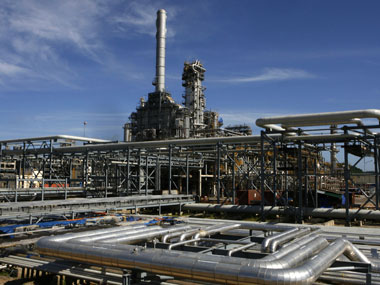Here’s the big beneficiary of the government’s proposal to allow airlines to import jet fuel directly: Reliance Industries.
According to a report in The Economic Times, cash-strapped Kingfisher Airlines is in talks with Reliance Industries to use the energy giant’s infrastructure to import jet fuel and transport it from ports to airports and aircraft. Reliance also confirmed it was in preliminary talks with airlines.
While private-sector oil companies are currently not allowed to import jet fuel directly themselves, they can provide infrastructure and transportation facilities to help airlines import the fuel.
The report quoted a source as saying that Jet Airways, Kingfisher Airlines and Air India have already been in touch with Reliance, and that supply contracts could be drawn soon.
[caption id=“attachment_206794” align=“alignleft” width=“380” caption=“gfhgfhg”]  [/caption]
The question is, is this what the government really wanted? Because as Firstpost pointed out in this story , the decision could do more harm than good. It won’t really help the aviation sector and will only add to the problems of an already troubled oil sector.
Here’s why:
One, it punishes state-run OMCs by taking away sales of what is possibly their only profitable product (in the fuel category) and diverting them to the private sector. They’re already making losses on every litre of kerosene, diesel and LPG they sell because of government controls on prices. Now they will be forced to take a hit on aviation fuel sales - about five million metric tonnes is consumed in the country every year - as well.
Impact Shorts
More ShortsBear in mind that state-run OMCs are not your typical loss-making public-sector entities. These are actually potentially highly profitable companies, operating at high levels of efficiency. The reason they’re bogged down financially - losses on selling products at subsidised products are estimated at Rs 1,40,000 crore by the end of this financial year ending March - is because they’re the victims of highly skewed energy sector policies. With direct jet imports, they’ll be victimised further.
Two, it’s still unclear how a cash-strapped airline like Kingfisher Airlines will pay Reliance for fuel when it can’t pay its fuel bills to OMCs. Overall, it’s also uncertain whether direct fuel imports will actually cut down operating costs for airlines.
Jet fuel accounts for nearly 50 percent of an airline’s operating cost and high taxes, including sales tax, are the main reason why jet fuel prices in India are among the highest in the world.
Direct fuel imports sound nice in theory, but in reality, airlines importing fuel directly need their own storage facilities at ports, transportation facilities to move the jet fuel from the ports to different airports and then getting the fuel from the airport into their aircraft. These will only add to their costs, and possibly negate any savings from sales tax.
Indeed, Jet Airways and Kingfisher Airlines (one of the most ardent campaigners of the proposal since last year) have already said it will be difficult for most airlines to import fuel directly because of a lack of infrastructure.
Three, it’s difficult to see how state governments will sit quietly and accept a proposal that could potentially cause them revenue losses. Direct fuel imports, in theory, helps airlines save on sales tax (imports for self-consumption don’t attract sales tax). However, since sales tax is a matter decided by states, there is likely to be stiff opposition from most of them on any central government proposal that allows airlines to bypass this tax.
A Mint report noted that states could levy a new “entry” tax on jet fuel to compensate for sales tax. Moreover, airlines will still have to pay customs and excise duties on their imports. In other words, the euphoria over direct fuel imports – and lower jet fuel taxes – may be very short-lived indeed.


)

)
)
)
)
)
)
)
)



